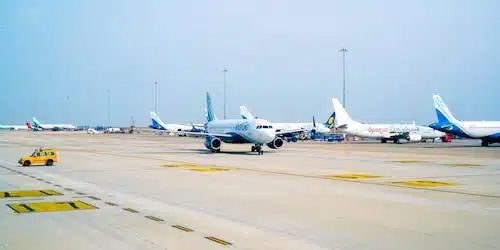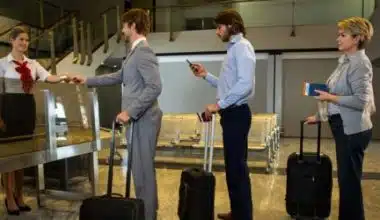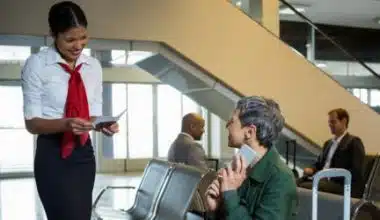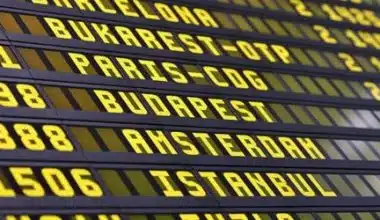Airlines are frequently forced to cancel flights due to difficulties facing the aviation industry. These cancellations may severely disrupt travel plans, which can annoy and irritate travelers. The airline can manage some of the causes behind canceling flights, but not all of them. Let’s take a look at some reasons why airlines are canceling flights
You may have been wondering why airlines are canceling flights more often in recent times. Travelers throughout the world are now frustrated and concerned about this problem. Numerous variables, such as inclement weather, a lack of crew, mechanical problems, security concerns, short notice, unavailable aircraft, problems with air traffic control, crew availability, and economic constraints, can result in flight cancellations. Examine the causes of these cancellations and the effects they may have on your travel arrangements.
Why are Airlines Canceling Flights?
Even if they are annoying, canceling flights by airlines can have advantages like increased customer satisfaction, operational efficiency, flexibility for passengers, aid with other arrangements, and passenger safety. Additionally, there are drawbacks that travelers could encounter. Inconvenience and interruption, monetary consequences, missed connections, restricted rebooking choices, lost time and productivity, effects on particular services, forfeiture of loyalty benefits, and difficulties with customer support are a few of these.
Airlines cancel flights for many reasons. These explanations can range from operational problems to meteorological factors. When considering whether to cancel a flight, airlines put operational effectiveness and passenger safety first.
To address the query, “Why are airlines canceling flights?” we will look at the top ten causes and how they affect travelers and the aviation business. By being aware of these causes, you can assist airlines in reducing the number of cancellations and better prepare yourself for unforeseen flight disruptions.
These are typical causes:
#1. Adverse Weather
Canceling of flights by airlines may occur due to bad weather. Weather patterns that include thunderstorms, snowstorms, intense rain, high winds, and fog can have a big effect on how safe flying is. These weather conditions may affect a pilot’s ability to safely take off, navigate, and land an aircraft. For example, a pilot’s vision is impaired when there is low visibility owing to fog or heavy rain, which blurs the runway.
To protect passenger safety, airlines may decide to cancel flights in certain circumstances. The weather at Stansted Airport caused the authorities to cancel every flight in 2022, the height of the winter season, when the temperature dropped below -10C.
#2. Safety
For airlines and regulatory bodies worldwide, airline security is of utmost importance. There are several security precautions in place to guarantee the safety of both passengers and staff, but occasionally these precautions result in flight cancellations.
One of the main reasons flights become delayed is because of enhanced security checks. For instance, a passenger’s suitcase might need to be personally searched if it sets off an alarm during the security screening procedure.
3. Tight Flight Schedule
When flights are scheduled with minimal time between arrivals and departures, it’s referred to as a tight flight schedule. The ripple effect of delays is one of the most frequent reasons that strict flight schedules can result in flight interruptions.
#4. Lack of Aircraft
Although routine maintenance and safety inspections keep aircraft safe to fly, unanticipated mechanical problems can occasionally arise. There may be a lack of available aircraft and flight cancellations if an aircraft is grounded because of maintenance problems.
#5. Lack of Passengers
Lack of passengers frequently happens for several reasons, such as seasonal demand and prevailing economic conditions. If there are insufficient passengers for a specific flight, the airline may decide to cancel it or combine it with another trip. Airlines must maintain a particular level of profitability to continue operating on constrained timetables.
#6. Air Traffic Restrictions
Flight cancellations are a major consequence of air traffic control and manpower shortage delays in an airline’s operations. The management of aircraft flow in the airspace is the responsibility of air traffic control, which also sets restrictions on the number of flights that can operate when the number of flights exceeds the airspace’s capacity.
#7. Problems With Mechanics
Mechanical issues can seriously disrupt flight schedules. Even though airlines service and maintain their aircraft regularly to guarantee reliability and safety, unanticipated technical issues might sometimes arise.
#8. Lack of Pilots or Staff
To run their flights, airlines need a lot of people, including pilots, flight attendants, ground crew, and maintenance professionals. Airlines may have to cancel flights if there is insufficient staff on hand.
#9. An Unfit Pilot
Flight cancellations may occur if a pilot is found to be unable to fly, particularly if there are no other licensed pilots available to take over the aircraft.
#10. Bird Strike
In the aviation business, bird strikes are frequent occurrences that can result in flight cancellations. When an aircraft strikes a bird while in flight or during takeoff or landing, it is referred to as a bird strike. The size of the bird and the airplane’s speed can both have a substantial impact on the extent of the damage that this collision can do to the aircraft.
Benefits of Airlines Cancelling Flights
There are benefits to airlines canceling flights, even though some travelers may find them annoying. A few benefits are as follows:
#1. Safety of Passengers
The security of its customers is an airline’s priority. When flights are canceled due to safety concerns, such as inclement weather, mechanical problems, or security threats, passengers are protected.
#2. Effectiveness of Operations
Airlines can streamline their processes when flights are canceled. Airlines can cut expenses and better utilize their resources by combining flights on specific routes or terminating flights with low passenger numbers.
#3. Adaptability for Travelers
Passengers who experience a flight cancellation frequently have flexible alternatives for refunds or rebooking. Passengers may be able to modify or cancel flights without incurring fines, giving them the flexibility to amend their travel schedules as necessary.
#4. Useful Arrangements
Airlines try their best to help customers find other ways to travel when flights are canceled. This may entail making new reservations on different airlines, providing lodging, or providing reimbursement for any annoyances brought on by the cancellation.
#5. Enhanced Performance on Time
The cancellation of flights can enhance an airline’s ability to operate on schedule. Airlines can have a more consistent schedule for the flights that remain by canceling those that are expected to have major delays.
#6. Upkeep and Fixtures
Airlines are given the chance to fix and maintain their aircraft when flights are canceled. Airlines can guarantee the dependability and safety of their fleet by proactively resolving any problems, which reduces the possibility of in-flight mishaps or disruptions.
#7. Scheduling and Crew Rest
Airlines can better schedule and manage crew rest when flights are canceled. Canceling a flight enables airlines to modify crew schedules in the event of unanticipated disruptions or delays, guaranteeing adherence to regulatory rest period requirements and mitigating fatigue-related complications.
#8. Cost Reduction
Airlines can save money by canceling flights that don’t have many reservations or aren’t profitable. Airlines can reschedule flights to maximize capacity or combine customers onto fewer planes to make better use of their resources and save losses.
#9. Better Guidance Regarding Operations
By examining the causes of flight cancellations, airlines can obtain important information for their operational planning. Airlines can enhance their overall operational efficiency by preventing similar interruptions in the future by making informed decisions based on the identification of trends or recurring issues that result in cancellations.
#10. Adherence to Regulation
Airlines that cancel flights may find it easier to meet different regulatory obligations. An airline can guarantee compliance and prevent fines or hazards by canceling a flight if it cannot achieve certain operational or safety requirements.
Disadvantages of Airlines Cancelling Flights
Airline cancellations can have advantages, but there are drawbacks as well that may impact travelers.
These are the drawbacks:
#1. Disruption and Inconvenience
Travel plans for passengers might be seriously disrupted and caused great inconvenience by flight cancellations. It can be difficult and time-consuming for passengers to have to change their plans, find alternate transportation, or book last-minute lodging.
#2. The Financial Consequences
Passengers may have financial repercussions from flight cancellations. Rebooking flights, altering lodging, or postponing other travel plans could result in extra expenses. Certain situations can prevent travelers from receiving their entire refund, based on the kind of fare and airline regulations.
#3. Missed Connections
Passengers who have connecting flights may miss them due to aircraft cancellations. Their final destinations may be delayed as a result, necessitating further reservations or overnight stays.
#4. Limited Rebooking Options
There might not be as many substitute flights available when a flight is canceled, particularly on popular routes or during periods of high travel demand. Finding acceptable substitute flights that fit their schedules and preferences may be difficult for travelers.
#5. Time and Productivity Losses
Passengers may lose time and productivity due to flight cancellations. They could have to spend more time traveling or at the airport, which could interfere with their personal or professional obligations.
#6. Impact on Special Services
When flights are canceled, passengers who need special services or accommodations—like people with disabilities or unaccompanied minors—may have more difficulties. Making other plans or making sure their unique requirements are satisfied could take longer.
#7. Loss of Loyalty Benefits
Flight cancellations may have an impact on an airline’s reputation or a passenger’s loyalty program. For frequent travelers, canceled flights could mean losing out on miles accrued, advantages from elite status, or other incentives related to their participation in a loyalty program.
#8. Issues with Customer Service
When flights are canceled, airlines may find it difficult to provide prompt and effective customer support. Getting the help and support travelers need might be challenging due to high phone numbers, lengthy wait periods, and staff shortages.
#9. Stress and Uncertainty
Passengers may experience anxiety and uncertainty following a flight cancellation, particularly if they are not given clear information or other options. Anxiety and inconvenience may result from passengers not knowing when they will be able to arrive at their destination.
#10. Restricted Income
Although airlines may make compensation for canceled flights, the type or quantity of compensation may be restricted. Travelers might not be fully compensated for any additional costs—like lodging or transportation—that they incur as a result of the cancellation.
Things to Do When Airlines Cancel Flights
There are a few things you can do to handle the situation when airlines cancel flights.
Here are a few things to consider:
#1. Verify any Updates
Check the airline’s website, smartphone app, or social media pages to stay up-to-date on the status of your flight. Airlines frequently give updates on cancellations, alternate routes, and rebooking procedures.
#2. Speak With the Airline
To find out more about the cancellation and your choices, get in touch with the airline immediately by phone at their customer support number or by online chat. Bring over your reservation information and any special requests or worries you may have.
#3. Request a Rebooking
Request a new reservation on the following flight that leaves for your destination. Whether they are operating the flight themselves or with partners, airlines will make an effort to place customers on alternative ones. Ask if you can be included on a standby list for early flights if there are no available seats right now.
#4. Look at Other Paths
Look into using another airline or route to get to your destination if the airline is unable to offer a suitable substitute flight. You may also look for flights that are available with other airlines or think about making connections at different locations. Remember that this can mean more expenses or longer journey durations.
#5. Make a Compensation or Refund Request
Should the airline be at fault for the cancellation or cause you to suffer an extended delay, you can be eligible for reimbursement or other benefits. Learn about your rights as a passenger and the airline’s policies. If necessary, make a claim for the proper compensation.
#6. Take Out Travel Insurance
Examine your policy to find out what is covered for airline cancellations if you have travel insurance. You might be qualified for compensation for specific costs or help with finding other travel options, depending on the policy.
#7. Make Contingent Plans
If the cancellation severely interferes with your travel schedule, such as causing you to miss a crucial function or connection, think about finding other accommodations. This could entail changing your route, informing other people of the change, or rescheduling your lodging.
#8. Record and Maintain Records
All correspondence you have with the airline should be documented, along with the times, dates, and names of the individuals you speak with. In the event of any future disputes or claims, this paperwork may be helpful.
#9. Remain Composed and Patient
Although handling flight cancellations can be annoying, it’s crucial to maintain composure and patience when speaking with airline employees. They are trying to aid several passengers in difficult circumstances, and a more amicable and considerate approach can make things go more smoothly.
#10. Arrive Early for Standby Aircraft
Your chances of finding a same-day standby flight may be improved if you arrive at the airport early and inform yourself in advance if your flight is canceled or delayed. By doing this, you may get to your destination sooner and steer clear of any potential problems. Having elite status with an airline may grant priority on standby lists.
Things to Do When Airlines Cancel Flights
Airlines frequently cancel flights for a variety of reasons, such as difficult operations, unfavorable weather, problems with air traffic control, a lack of crew, technical concerns, unanticipated events, and airline-specific considerations. Usually, the reasons for these cancellations are to preserve operating effectiveness and give priority to passenger safety. In these circumstances, airlines strive to minimize disruptions and offer support to impacted passengers.
Why Are Airlines Canceling Routes?
Airlines may cancel routes due to a variety of reasons, such as market changes, cargo issues, labor shortages, mergers and acquisitions, and outside forces. Airlines have strategically decided to make these cancellations in order to maximize their financial performance and operational efficiency.
Is It Normal for Airlines to Cancel Flights?
Airlines do indeed frequently cancel flights. A number of variables, such as operational difficulties, inclement weather, problems with air traffic control, staffing shortages, technical concerns, unanticipated events, and airline-specific considerations, can result in flight cancellations. Usually, these cancellations are made in order to preserve operational effectiveness, address economic viability, or prioritize passenger safety. There can be a wide range in the frequency of flight cancellations based on the airline, the area, and outside events.
Which Airlines Are Canceling the Most?
There are more cancellations and delays on some airlines, including American Airlines, Southwest Airlines, Delta Air Lines, and JetBlue Airways, during specific times of the year. However, the frequency of cancellations is subject to change over time and is dependent on a number of variables.
Why Is Flying So Bad Right Now?
A number of factors, including severe weather, excessive demand, operational difficulties, a decline in the quality of the flying experience, airline tactics, and infrastructure and regulatory obstacles, may make flying difficult at the moment. These elements may be responsible for flight delays and a perceived deterioration in the overall flying experience. However, these difficulties can change over time and might not be relevant to all airlines or areas.
What Happens If a Flight Gets Cancelled?
In the event of a flight cancellation, it is the airline’s responsibility to offer impacted customers alternate accommodations. This includes giving refunds, moving customers to the next available aircraft, and maybe paying compensation based on the situation. The cancellation should be communicated to the passengers, who can then get help from the airline’s customer care. Credit card travel protections may also reimburse for costs incurred as a result of the cancellation.
Summary
When a flight is canceled, it’s critical to stay informed, get in touch with the airline to inquire about rebooking options, look into alternate routes, ask for reimbursement or other compensation if necessary, think about travel insurance, make any necessary alternative arrangements, keep track of all correspondence, and remain composed and patient throughout the ordeal. You can manage the situation and lessen its influence on your travel arrangements by taking the actions listed below.
- ARE DISNEY TICKETS REFUNDABLE? All You Need To Know
- TRIP CANCELLATION INSURANCE: How It Works
- WHAT HAPPENS IF YOU MISS YOUR FLIGHT | Best Actions To Take
- HOW MUCH DO FLIGHT INSTRUCTORS MAKE? 2023 Salaries
- WORST NEIGHBORHOODS IN CHICAGO IN 2023






